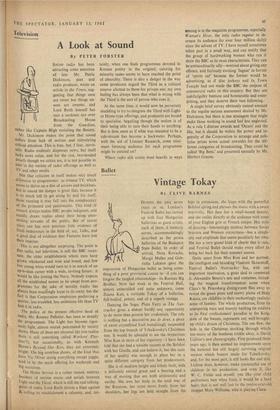Television
A Look at Sound
By PETER FORSTER SOUND radio has been attracting some attention of late. Mr. Patric Dickinson, poet and radio producer, wrote an article in the Times, sug- gesting that things seen are sweet but things un- seen are 'sweeter, and Lord Reith himself has cast a sardonic eye over Mr. Dickinson makes the point that sound suffers from lack of serious and stimulating critical attention. This is true, but, I fear, inevit- able. Radio endlessly dispenses news, but itself lacks news value, and for the rest, two-headed dwarfs though we critics are, it is not possible to take in the variety of radio offerings as well as TV and other media.
Not that criticism in itself makes very much difference to programmes: as witness TV, which seems to thrive on a diet of arrows and brickbats. But in sound the danger is great that, because it IS so much left to get along by and for itself, those running it may fall into the complacency of the protected and pensionable. This kind of remark always makes BBC people indignant, and Usually draws replies about their being unre- mitting servants of the public. But of recent Years one has seen precious little evidence of fresh endeavours in the field of, say, Talks, and a good deal of evidence that Features have lost their impetus.
This is not altogether surprising. The point is that radio, not television, is still the BBC incar- nate, the older establishment where men have grown whiskered and wise and bored, and few live young wires would turn to it in search of an oP-to-date career with a wide, inviting future: it Would be like joining the Navy. Nobody expects all the established names to be swept from -pro- grammes for the sake of novelty (radio has always been touchingly loyal to its own); but the fact is that Corporation employees preferring a quieter, less troubled, less ambitious life than TV find it in radio.
The policy of the present effective head of radio, Mr. Rooney Pelletier, has been to stratify the programmes. The Light has become rigor- ously light, almost muzak punctuated by variety shows. Many of these are abysmal (do you realise there is still something called Workers' Play- time?), but occasionally, as with Kenneth Horne's Beyond Our Ken, they are extremely bright. The big omnibus shows, of the kind that have Vic Oliver doing everything except juggle, tend to be the stock offering for weekends and big occasions.
The Home Service is a rather muted, midway business of serious music and serials between Light and the Third, which is still the real talking- point of radio. Lord Reith directs a blast against ft, calling its establishment a calamity, and, cer- tainly, when one finds programmes devoted to Korean poetry in the original, catering for minority tastes seems to have reached the point of absurdity. There is also a danger in the way some producers regard the Third as a cultural reserve allotted to them for private use; my own feeling has always been that what is wrong with the Third is the sort of person who runs it.
At the same time, it would now be perversely muddling to try to integrate the Third with Light- or Home-type offerings, and producers are bound to specialise, beguiling though the notion is of their being able to turn their hands to anything. But it does seem as if what was intended to be a side-stream has become a backwater. Perhaps, with the aid of Listener Research, some mini- mum listening audience for each programme might be insisted on?
Where radio still scores most heavily in ways unsung is in the magazine programmes, especially Woman's Hour, the only radio regular to in- crease its audience (to over four million daily) since the advent of TV. I have myself sometimes taken part in a small way, and can testify that the group of hardworking women who run it show the BBC at its most characteristic. They can be extraordinarily silly—worried about giving any offence, and furiously excising 'Jaguar' in favour of 'sports car' because the former would be advertising, as if disc jockeys and In Town Tonight had not made the BBC the outpost of commercial radio in this country. But they are indefatigably humane and honourable and enter- prising, and they deserve their vast following.
A single brief survey obviously cannot amount to the regular serious assessment desired by Mr. Dickinson, but there is one stratagem that might make those working in sound feel less neglected. As a rule I distrust awards and 'Oscars' and the like, but it should be within the power and in- genuity of the Corporation to arrange and pub- licise prizes (even actual rewards) for the dif- ferent categories of broadcasting. They could be called 'Big Bens,' and presented annually by Mr. Herbert Greene.


































 Previous page
Previous page